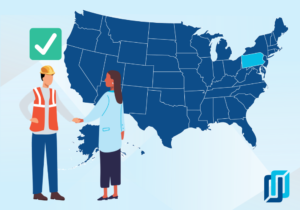
In Pennsylvania Construction Industry Employee Verification Act is now effective, as of October 7, 2020. Anyone involved in construction in Pennsylvania needs to be aware of these requirements when hiring employees. Let’s take a look at the specifics under the Act.
Pennsylvania Construction Industry Employee Verification Act: What the law requires
These new regulations effectively prohibit the employment of unauthorized employees, specifically in the construction industry. This Act imposes additional hiring verification processes along with certain document retention requirements. When this legislation was initially proposed, the legislature stated that:
“There are many unscrupulous employers who hire individuals not authorized to work in the U.S for their construction teams. These employers and their unfair business practices hurt workers by driving down wages, create an unlevel playing field for other employers to compete against, and deprive government of revenue that would be used to fund programs like unemployment compensation.”
In order to prevent this trend of hiring unauthorized workers, Pennsylvania passed HB 1170. Here’s the bill’s short title: “An Act prohibiting the employment of unauthorized employees; requiring construction industry employers to verify the Social Security numbers of employees; and imposing penalties.”
These new requirements will be regulated and investigated by the PA Department of Labor and Industry (DLI).
Who does this Act apply to?
Under this new Pennsylvania Construction Industry Employee Verification Act, these requirements apply to anyone who:
“Engages in the erection, reconstruction, demolition, alteration, modification, custom fabrication, building, assembling, site preparation and repair work or maintenance work done on real property or premises under a contract, including any work for a public body, or work paid for from public funds.”
Thus, any individual, entity, or organization in the “construction industry” within the Commonwealth will be subject to these rules. This includes staffing agencies that supply workers to the construction industry and subcontractors.
New requirements for construction industry employers
Once this law is effective (October 7th, 2020 to be exact), there are two main things that employers in the construction industry must keep in mind in order to stay in compliance.
- Construction businesses must use E-Verify when hiring employees
- Businesses must keep a record of hiring and verification documents for a certain period of time
Learn more: How to comply with Pennsylvania’s new E-Verify law
Verification requirements
Since the Immigration Reform and Control Act of 1986, anytime an employer hires an individual, they are required to fill out a Form I-9: Employment Eligibility Verification. This act doesn’t change the I-9 requirements.

But under this new law, employers must take a second step. They must register and verify that information against a national database known as E-Verify. This system is backed by the Social Security Administration and the Department of Homeland Security.
This has been a requirement for all public construction projects in Pennsylvania, but with this new legislation, it will apply to all construction projects within the Commonwealth.
Document retention requirements
In addition to verifying the employment eligibility of new-hires, there is also a provision requiring that construction employers keep verification documents for a certain period of time.
They must keep Form I-9 for new employees as records for either: (a) 3 years from the date of hiring, or (b) 1 year after the termination of the employee, whichever is longer. As for the E-verification, these documents must be kept for the entire duration of the individual’s employment, or 3 years; whichever is later.
Saving documents isn’t just important for compliance with the law. We’ve said it before: A good document retention strategy can help contractors save money.
Procedures for violation of the Act
As stated above, these new requirements will be regulated and investigated by the PA Department of Labor and Industry (DLI). Let’s see how this works in practice.
Investigation of violations
Any complaints concerning a violation will be issued to the DLI. At that time, the Act provides the Department the authority to investigate the legitimacy of the claim. This includes the ability to enter and inspect the records and employer’s place of business at any reasonable time. In addition to that, they may also make copies of the records, request statements concerning the hiring practices, and interrogate any employees to determine compliance.
Enforcement procedures under the Act
If the DLI does determine that a violation occurred, a warning letter will be issued to the employer. This letter will request that the employer terminate the unauthorized worker within 10 days. The employer will then have to verify the termination with the DLI. Don’t forget this second step! Even if you fired the worker, failure to verify the termination can be counted as a second violation.
A second violation means that the DLI will refer the issue to the Attorney General’s (AG) office. At that point the AG has the authority to file a claim against the employer. If found guilty, an employer may be placed on probation, requiring filing quarterly reports to the DLI. Any further violations could result in the suspension of the employer’s business license.
Defenses to a violation under the Act
Of course, not all information acquired through the E-Verification system will be accurate. Accordingly, the Act does provide two defenses or safety valves for employers who rely on the information. First scenario is if the employer can offer proof that they verified the employees authorization, but is later found to be unauthorized to work. This will create a rebuttable presumption that the employer didn’t knowingly employ an unauthorized employee.
On the opposite end of the spectrum, if an employee is not hired or terminated based on incorrect information provided on the E-Verification system, it will relieve the employer from liability to the fired/non-hired employee.

